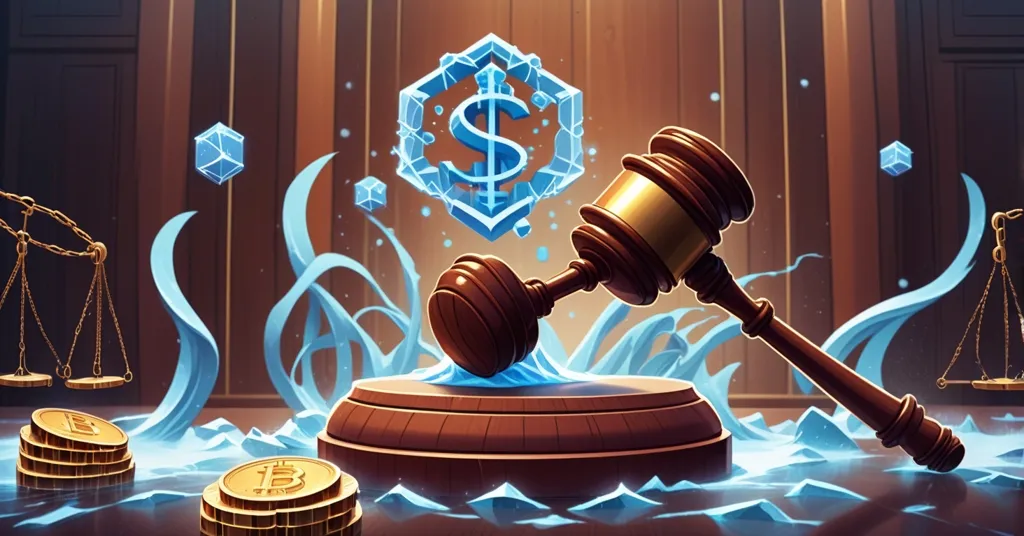Ripple v. SEC Case Stalls Again: Appeal Paused Until 2025 Amid Settlement Woes

Ripple v. SEC Hits Another Roadblock: Appeal Paused as Settlement Languishes
The legal showdown between Ripple and the U.S. Securities and Exchange Commission (SEC) has ground to yet another exasperating halt. Both parties have requested the Second Circuit Court of Appeals to pause proceedings, extending a saga that started in 2020 over Ripple’s alleged $1.3 billion unregistered XRP sales. This case remains a linchpin for cryptocurrency regulation in the U.S., and the latest delays only deepen the uncertainty for the entire blockchain industry.
- Latest Stalemate: Appeal paused until at least August 15, 2025, as Ripple and the SEC await district court approval of a settlement.
- Settlement Snag: A proposed $50 million penalty deal was rejected for lacking “exceptional circumstances,” with no new ruling yet.
- Industry Stakes: The outcome could redefine how digital assets are classified and regulated, impacting every crypto project.
Legal Gridlock: Unpacking the Delay
This isn’t just a minor hiccup—it’s a full-blown bureaucratic nightmare. The SEC sued Ripple in December 2020, claiming the company raised $1.3 billion by selling XRP as an unregistered security. For those new to the crypto space, a “security” under U.S. law is typically an investment tied to a company’s performance, like stocks, requiring strict registration and disclosure. The SEC argued that XRP, often marketed as a bridge currency for cross-border payments, fits this mold, especially in sales to institutional investors. Ripple countered that XRP is more like a currency or commodity, outside the SEC’s grasp, as detailed in comprehensive overviews of the Ripple Labs legal battle.
A partial ruling in July 2023 by Judge Analisa Torres offered some clarity but not enough to end the fight. She determined that XRP sales to retail investors via exchanges (known as programmatic sales) didn’t meet the Howey Test—a legal benchmark that checks if an asset qualifies as an investment contract by relying on a third party’s efforts for profit. In simpler terms, if you bought XRP on Coinbase expecting gains purely from market forces, it’s not a security. However, direct sales to institutional investors were ruled securities violations because they tied XRP’s value more explicitly to Ripple’s actions. This split decision was a partial victory for Ripple but left penalties and future compliance up in the air. Are we seriously going to force blockchain tech into a regulatory box designed for Wall Street in the 1930s? That’s the frustrating question still looming, with deeper insights available in this expert analysis on XRP’s securities classification.
The latest attempt at resolution came with a settlement agreement signed on May 8, 2024, which seemed like a way out of this mess. The terms were straightforward:
- Ripple pays a $50 million penalty—peanuts compared to the SEC’s initial $1.3 billion claim.
- $75 million of a previously imposed $125 million civil penalty, held in escrow, gets returned to Ripple.
- An injunction limiting Ripple’s business activities is dissolved.
Seems reasonable, right? Wrong. On May 15, 2024, the district court rejected a motion for an indicative ruling—a procedural step where a lower court hints if it would revise its judgment if a higher court allows. The judge ruled there were no “exceptional circumstances” to justify altering the prior decision. A renewed motion was filed on June 12, 2024, to address the court’s concerns, but as of now, there’s no verdict. Both sides have since asked the Second Circuit Court of Appeals to keep the case on hold, with the SEC requesting an extension until August 15, 2025, for an update. That’s over a year of thumb-twiddling, folks. Defense lawyer James K. Filan suggests this joint pause is strategic, with both parties betting on a district court nod but bracing for more roadblocks, as covered in recent updates on the court pause and penalty details. XRP lawyer Bill Morgan remains cautiously hopeful for settlement approval, but the clock keeps ticking louder than a Bitcoin halving countdown.
Ripple’s Response: Innovating Through the Storm
While the courtroom drama drags on like a bad soap opera, Ripple isn’t sitting idle. The company continues to push the boundaries of blockchain utility, most notably with the launch of RLUSD, a U.S. dollar-pegged stablecoin, on December 17, 2024. Approved by the New York Department of Financial Services, RLUSD operates on both the XRP Ledger and Ethereum, aiming to boost institutional DeFi and real-world asset tokenization. What’s that mean? It’s about turning tangible assets like gold or Treasury bills into digital tokens tradable instantly on a blockchain—cutting out slow, costly middlemen. Ripple’s also expanded into custody solutions through its 2023 acquisition of Metaco and partnerships with firms like Archax for tokenized assets on the XRP Ledger. With transaction volumes exceeding $50 billion and ties to over 55 countries via solutions like Ripple Payments (formerly On-Demand Liquidity), they’re still swinging big, despite ongoing legal challenges discussed in community forums like Reddit updates on the XRP case.
Market sentiment hasn’t completely soured either. As of mid-2025, XRP boasts a market cap of roughly $127.82 billion, with a price hovering around $2.17. That’s no small feat for a token under a regulatory cloud. XRP’s pre-mined supply of 100 billion tokens, with 55 billion locked in escrow and released monthly, plus a deflationary mechanism where transaction fees are burned, adds layers of intrigue to its value proposition. Legal uncertainty be damned—the market still sees potential here. But let’s not get carried away with Twitter shills hyping XRP to $100 if Ripple wins. This case is about regulation, not moonshot pumps, and we’re not here to peddle that nonsense, a sentiment echoed in broader discussions on platforms like Quora regarding the impact of this lawsuit.
Why This Matters for Crypto: A Regulatory Domino Effect
Zooming out, the stakes of this case dwarf Ripple or XRP alone. It’s a bellwether for U.S. crypto regulation, with the power to shape how digital assets are classified—security or not?—and how token sales are policed. A brutal precedent could strangle innovation, forcing projects to flee to friendlier shores or drown in legal fees. Imagine every blockchain startup facing SEC lawsuits because their token vaguely resembles an investment—costs skyrocket, progress stalls. On the flip side, a Ripple win might loosen the regulatory noose, emboldening the industry, as explored in detailed reports on SEC vs. Ripple implications for blockchain. But here’s the devil’s advocate take: if Ripple gets off with a slap on the wrist, could it open the floodgates for centralized token schemes that dilute the decentralized ethos Bitcoin stands for? Unlike BTC’s leaderless, permissionless network, Ripple’s tight grip on XRP’s distribution gives the SEC ammo to call it a company-driven investment. A victory might ease pressure short-term but invite weaker, scammier projects long-term. That’s a tension worth wrestling with.
Then there’s the global angle. While the U.S. fumbles with lawsuits, Europe’s MiCA framework is setting clearer rules for token classification upfront. Asia’s patchwork of policies ranges from bans to open arms. If the SEC keeps playing whack-a-mole, could Ripple—and other projects—pivot overseas? The U.S. risks losing its edge in blockchain innovation if it can’t adapt. Look at past SEC crackdowns, like Telegram’s TON project in 2020, where a promising blockchain was scrapped over securities claims. This isn’t a one-off; it’s a pattern of regulatory fog that screws over innovators and investors alike, a concern highlighted in ongoing crypto regulation news surrounding Ripple.
Decentralization at Stake: Where Do We Draw the Line?
As champions of decentralization and disrupting the status quo, we have to ask: does XRP’s model even align with the permissionless future we’re fighting for? Bitcoin maximalists might argue Ripple’s centralized structure—pre-mined tokens, corporate control—clashes with the leaderless vision of true blockchain freedom. Sure, Ripple’s tech has utility, especially for institutional finance, but at what cost to the purity of decentralization? If this legal battle accelerates crypto’s adoption by forcing innovation outside broken systems, as effective accelerationism suggests, then maybe these delays are a perverse blessing. Build unstoppable, court-proof networks, and let the SEC chase ghosts. But if the U.S. clings to outdated frameworks, the future of finance might just be coded elsewhere—decentralized and untouchable, a topic covered in recent news on the stalled Ripple v. SEC appeal.
So, where does this leave us? Will Judge Torres greenlight the settlement soon, or are we doomed to another year of legal ping-pong? XRP holders on social platforms are venting hard, with some calling this “death by a thousand delays.” Potential XRP ETFs and broader financial integration hang in the balance too. One thing is certain: this isn’t just courtroom theater; it’s a battle for how crypto evolves. The rollercoaster rolls on, and we’re all strapped in for the ride, with the latest settlement status updates from August 2024 shedding light on the ongoing delays.
Key Takeaways and Burning Questions
- What’s the current holdup in the Ripple v. SEC case?
Both parties have paused their appeal until at least August 15, 2025, waiting for district court approval of a $50 million settlement, which was rejected earlier for lacking “exceptional circumstances.” - What did the 2023 ruling mean for XRP?
Judge Torres ruled retail XRP sales on exchanges aren’t securities, but institutional sales are—leaving penalties and compliance unresolved and fueling this ongoing mess. - Why should the crypto community care about this lawsuit?
It could set precedents for token classification and regulatory oversight in the U.S., either choking innovation with harsh security labels or freeing up space for blockchain growth. - How is Ripple coping amid the legal uncertainty?
They’re pushing forward with RLUSD, a stablecoin for institutional DeFi, and enterprise solutions, holding a $127.82 billion market cap for XRP with partnerships spanning 55+ countries. - Could a Ripple win undermine decentralization?
Potentially—critics argue a victory might validate centralized token models, clashing with Bitcoin’s permissionless ethos and possibly inviting weaker, less decentralized projects. - How does this fit into global crypto regulation?
As the U.S. stalls, Europe’s MiCA offers clearer token rules, and Asia’s varied approaches could lure projects like Ripple abroad if the SEC doesn’t ease up. - Will this drag on past 2025?
Quite likely—further district court delays or pushback on rulings could stretch this into even murkier timelines, keeping the industry guessing.



